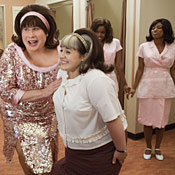- REVIEW
- READER REVIEWS
Hairspray
|
|
Genre
Comedy, Musical
Producer
Neil Meron, Craig Zadan
Distributor
New Line Cinema
Release Date
Jul 20, 2007
Release Notes
Nationwide
Official Website
Review
In 1988, before the opening of John Waters’s Hairspray, I found the Prince of Puke—the man who ended Pink Flamingos with his homicidal heroine scooping up and eating a fresh doggy turd—gleeful at having made a liberal teen-message movie with a PG rating. Of course, it was a satire of teen-message movies, starring a 400-pound transvestite (the late doggy-turd eater Divine) as the chubby heroine’s mother. But the subversiveness eased under the radar. Waters liked when I called it a family movie the Bradys and the Mansons could adore. He only wished it were rated G. (He added that he wanted to make an X-rated film with no nudity, violence, or four-letter words: “It would just be so offensive to peoples’ values.”) The emergence of Hairspray as a hit Broadway musical was the ultimate joke. Now busloads of suburbanites could thrill to what began as a gay boy’s wet dream of the fusion of early rock and roll and outlandish middle-class tackiness.
Adam Shankman’s movie of the Broadway Hairspray gets better as it lumbers along, but there’s something garish about its hustle—it’s like an elephant trumpeting in your face. Every number is a showstopper: pumping arms, ecstatic frugging, hyperactive editing, climax on top of climax. The songs have the same manic pitch and blur together; there’s nothing as seductive as the centerpiece of Waters’s movie, the sinuous “Limbo Rock.” The musical opens with our heroine, the hefty Tracy Turnblad (Nikki Blonsky), popping out of bed and bursting into “Good Morning, Baltimore,” a cheerfully oblivious celebration of her seedy, lower-middle-class block. (Watch for the Waters cameo.) It’s a crowd-pleaser, and Blonsky’s voice is sweet and not too piercing. But Tracy’s delusional optimism has already peaked: How much higher can she go? When she lands a spot on her favorite TV program, the local teen-dance showcase The Corny Collins Show, and becomes a sensation, the campiness has no zing. It seems like a world of Village idiots.
It was Divine, as Tracy’s overprotective mother, Edna, who lifted Hairspray into camp heaven—and Divine and her splendid trashy baggage who’s most painfully missed. On Broadway, the lovable Harvey Fierstein was at least a resourceful queen. For most of the film, John Travolta is a glaring mistake. For some reason, his face is ballooned with latex that hides his most endearing feature, that goofy cleft chin. With his studied Baltimore accent, he’s soft and shapeless, his casting a stunt with no reason for being except as a stunt. But then something magical happens. Travolta has a number, “(You’re) Timeless to Me,” with Christopher Walken as Edna’s dim, doting husband, Wilbur. The song is in a different key, in a lilting, big-band style, and Walken is a musical pro (and scandalously little used in that capacity). When Travolta joins him in a dance, tentatively but with blooming grace, the performance comes together. (It’s also the only number that isn’t edited by a Benihana chef.) Later, Travolta reprises a Grease move, and it doesn’t feel cheap: It’s a reminder of his underused gifts.
As the melodrama takes hold, Hairspray becomes more involving. Waters based The Corny Collins Show on Baltimore’s The Buddy Deane Show, which came smack up against the civil-rights movement: No one knew what to do about the prospect of whites and “Negroes” dancing together. Michelle Pfeiffer plays Velma, the show’s brittle manager and the mother of its blonde diva (Brittany Snow), and it’s a marvelous turn: hysterically stylized, as if her Catwoman had joined the cast of Dynasty. Velma wants both Tracy and the coloreds off the air, and gets her chance when the girl becomes a regular at Negro platter parties (“hotbeds of moral turpitude”—but overseen by a disappointingly vanilla Queen Latifah) and civil-rights protests. Tracy’s best friend (Amanda Bynes), a blithe simpleton, is enraptured by a fresh-faced black dancer (Elijah Kelley) and twitters that now that she has tasted chocolate, she’s never going back—about as racy as the movie gets. The boisterous finale, “You Can’t Stop the Beat,” would have more punch if Marc Shaiman’s score weren’t so homogenized, with so little distinction between the white and black numbers. Hairspray doesn’t just preach color blindness. Its Utopia is also color deaf.
Related Stories
New York Magazine Reviews
- David Edelstein's Full Review (7/23/07)
